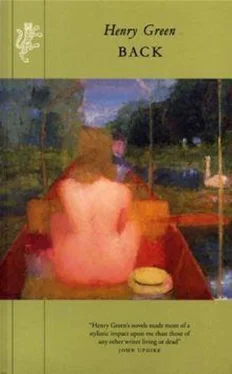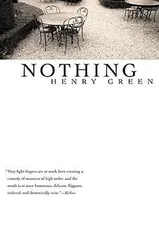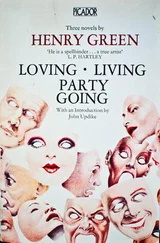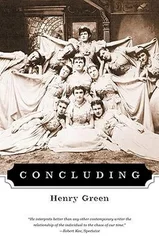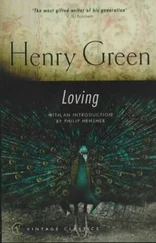“Dear / go down to Redham for me and / tell them how you saw / those mules / coming up to London. / So be a dear / and go down / From Rose.”
He felt he had been exceedingly clever, till, all at once, he realized he had destroyed, cut into ribbons, every letter he had ever had from Rose. Then he despaired, blaming himself. But he could think of no other way to get an expert opinion. And he knew Nance was really Rose. And, after all, that had killed her letters.
So, for the evening, he mourned the fact that Rose’s treachery had destroyed the last there was left to him, the letters which, for all the months and years in Germany, had been what he was most afraid to find mislaid, or lost, when he got back.
Yet that night he slept very well for once, and did not dream.
It rained all the August holiday. The Phillips’ home in which Charley had last known Rose, was on a main road just off the village street. Convoys of American army trucks shook the old house, the whole day. Often Dot had to yell to make herself heard. The three of them even had difficulty in getting across to the pub opposite, where darts, at times, were shaken off the pig bristle board. From out the darkness of their cabs the nigger drivers could be told only by their white smiles.
As soon as Dot and Charley arrived, James took her up to see the room. She looked brazenly at where she was to sleep. Because, she felt, she knew what she was there for. It was a double bed all right.
“Very nice I’m sure,” she murmured.
“What?” he asked, for, with a noise like thunder, another line of heavy lorries was being driven past. She repeated herself, and moved to the dormer window which looked over the back. It had sounded crude to say that again.
“Where’s Charley’s room?” she then enquired, but he did not hear this either. She felt she could not put that twice, and to cover her embarrassment she traced Dot with a finger on the leaded window. She’d treated herself to a manicure up in town. Its nail was enamelled to the colour of wet flesh.
James laughed. “Oh well you know there’s nothing very special, I’m afraid,” he said. “In fact, I’m very much afraid.” As he stood at her side she could risk a glance. She confirmed that he was staring at her hand. It was lucky, she thought, that she’d had them done over.
“Silly of me,” she said, “but when I come on lovely old windows I always wish I had a diamond to cut my name.”
He laughed once more. She thought he would be O.K., though as yet she had, of course, no idea at all how, or how much.
“We’ll have to see about that,” he replied, but extremely pleasant, nothing to take exception to.
“What?” she exclaimed, yet she had heard. “Scribble right over your beautiful old windows? I’m sure you’d wonder how I’d been brought up. The very idea. Why I wasn’t serious, I should hope not indeed.”
“Well, make yourself comfortable. I must get old Charley fixed up now,” he said. “Then we’ll have a bite to eat. It’s only cold, but I’ve a little something laid out in the kitchen. See you directly,” and he went.
There was nothing more that night, absolutely nothing. They’d had a nice supper, and weren’t these country people all right for food. Then they’d gone over the way where they bought her a few drinks. They wouldn’t have it when she tried to pay for a round. At last she’d said, “All good things must come to an end,” looking at Charley as she spoke, so much as to cry it out loud. So they came back to the house with her, and she’d slipped upstairs, got into a smashing pyjama suit bought specially the day before, put out the light and, quaking with wonder, she’d lain there. She could hear them talk in the kitchen. And how they’d talked. Then they came up. And she’d wondered some more. Her own worst enemy would not have laughed at her that half hour. Even if it wasn’t the first time, of course. But nothing. She was all ready, pretending to be asleep, spread out like butter on bread. But nothing. She knew it was Charley when he went to the bathroom. For just that minute it was delicious to wait. But what all this added up to, she felt at the time, was that these repatriated men came back very queer from those camps. So in the end she’d gone to sleep alone, unvisited.
The next day they’d done this, that, and the other, all very pleasant to be sure, but nothing in particular. Charley’d never come out of himself, he’d stayed just like he was in the office. The two men were thick together, though. The wife’s name cropped up once or twice. Rose. She thought she could see where the land lay. This visit was a bit of for old times’ sake, she fancied. Oh they’d made themselves very friendly, except to do out her own room they never let her help in any way. But, by the second evening, she’d made up her mind there was nothing to it, nothing whatever. Charley’d had her down to be gooseberry. Then, after another very enjoyable little party over the road, she went up early to get her beauty sleep, because it was a pity to throw away this good country air which was already doing things to her skin, and she was just dropping off when the door did open a crack, someone came in, into her bed even, the sauce, and, believe it, or not, it was that fat James, though everything had been so dark she hadn’t known till after.
That very first evening, when Charley did not come, while she lay in bed as they talked downstairs, she had asked herself if he was being told something which kept him. He was and he wasn’t. To tell the truth, he had forgotten that she existed.
There was a silence this first night after she left for bed until Mr Phillips announced,
“Well here you are again then, Charley.”
“Yes,” Charley Summers replied. They were sitting opposite each other, over cups of tea.
“It seems a long time,” Mr Phillips said. Charley did not reply.
“I’ve put her in Rose’s old room,” Mr Phillips explained. Charley looked at him, but the widower’s face was bland. Then the man went on, “Who is she?”
“Works with me.”
“You London office people get all the fun and games,” Mr Phillips said. “But don’t wake Ridley, will you?”
“Doesn’t he sleep any better than his mother did, then?”
“Yes,” James replied. “She was always complaining about that, wasn’t she?”
“Well I mean,” Charley loyally objected. “It’s rotten if you can’t sleep.” He was surprised to find he could be cold once more, while speaking of her, cold.
“They get more than they realize,” Mr Phillips said.
“No way of telling.”
“There is if you’re stretched out by their side,” Mr Phillips answered cheerfully. “Many’s the time I’ve listened to her snore, when she’s told me the next day she hadn’t slept a wink all night.”
“I didn’t know,” Charley lied, delighted that he could talk easily of Rose. He couldn’t now imagine why he had got himself into such a state about her handwriting. All of a sudden, or so he thought, she was dead to him at last. She was really gone.
“The doctor seemed to think it affected her resistance at the last,” James went on. “I didn’t undeceive him. You see she’d complained of not sleeping ever since I brought her here.”
“I couldn’t drop off when I first got back. It was the quiet.”
“You weren’t having raids out there, not all the time, surely?”
“Sleeping alone,” Charley explained. “After twenty to a room.”
“What did the Army doctors say?” Mr Phillips asked.
“They’re all trick cyclists now,” Charley said. “Best not to undeceive those merchants either.” Then his mind turned to Mrs Grant. “Did the family come down when she lay dying?” he lazily enquired, free as air about Rose.
Читать дальше
